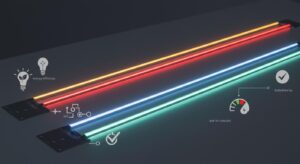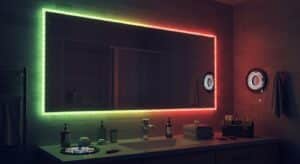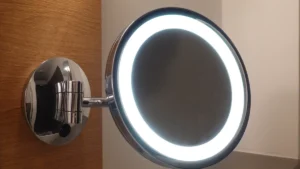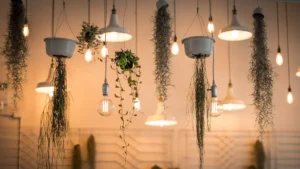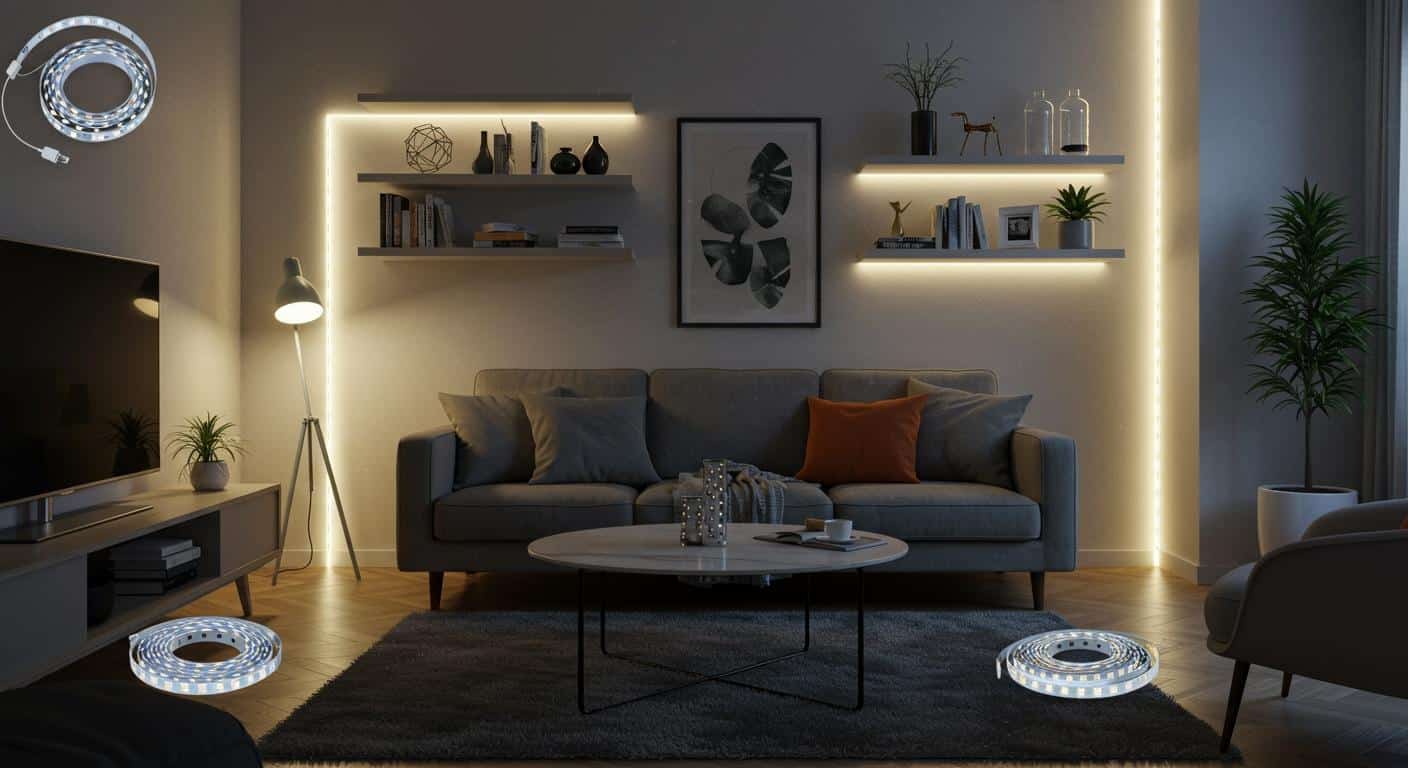
LED strip lamps are popular because they are flexible and have cool designs. You can use them in many places, like homes and businesses. They are important in modern design because they make spaces look better and work better. By 2025, the worldwide market for LED strip lights is expected to be about USD 7.3 billion. This is a growth rate of 17.4% each year. New technology will make them use less energy, offer more choices, and connect with smart lighting. These features will attract more eco-friendly buyers.
Key Takeaways
LED strip lamps are bendable and save energy. They are great for homes and businesses.
There are different kinds of LED strips. RGB and smart options have special features for fun and easy lighting.
Installing them correctly is very important. Clean surfaces and good airflow stop overheating and help them last longer.
When picking the right LED strip, think about brightness, color choices, and safety certifications to ensure quality.
LED strip lights can last up to 50,000 hours. This cuts down waste and electricity costs while making your space better.
LED Strip Lamp Overview
LED strip lamps are new lighting options made of several important parts. Knowing these parts helps you see how they work together for good lighting. Here’s a list of the main parts of LED strip lamps:
Component | Function |
|---|---|
LED chip | Makes light when electricity flows through it. |
LED driver | Controls voltage and current for the best LED performance. |
PCB | Holds the LED parts and connects them electrically. |
Optics | Directs and focuses the light to create the right beam pattern. |
Heatsink | Cools down the heat made by the LED to keep it safe. |
LED controller | Manages how the LED lights work, making sure they do their job. |
Housing | Protects all parts from air, moisture, and dust, helping them last longer. |
The flexible design of LED strip lights makes them useful in many ways. Many LED strips have sticky backs, which makes it easy to put them on walls and furniture. You can cut them to size, so they fit different lighting needs. Here are some good things about their flexible design:
LED strip lights save energy because they use low voltage, making them better than regular lights.
Their slim shape lets them fit in small spaces where bigger lights can’t go, perfect for hidden lighting.
The flexibility of LED strips lets them bend and follow curves, making them great for both practical and decorative uses.
They can fit into almost any place because they are soft and bendable, following curves or sharp corners.
The sticky backing is very important for putting up and keeping LED strip lamps. Using good installation methods, like sticking the adhesive on clean, dry surfaces, helps it stick better and stops peeling later. The installation is easy and usually only needs the sticky backing, so you can do it without needing a professional.
Types of LED Strip Lights
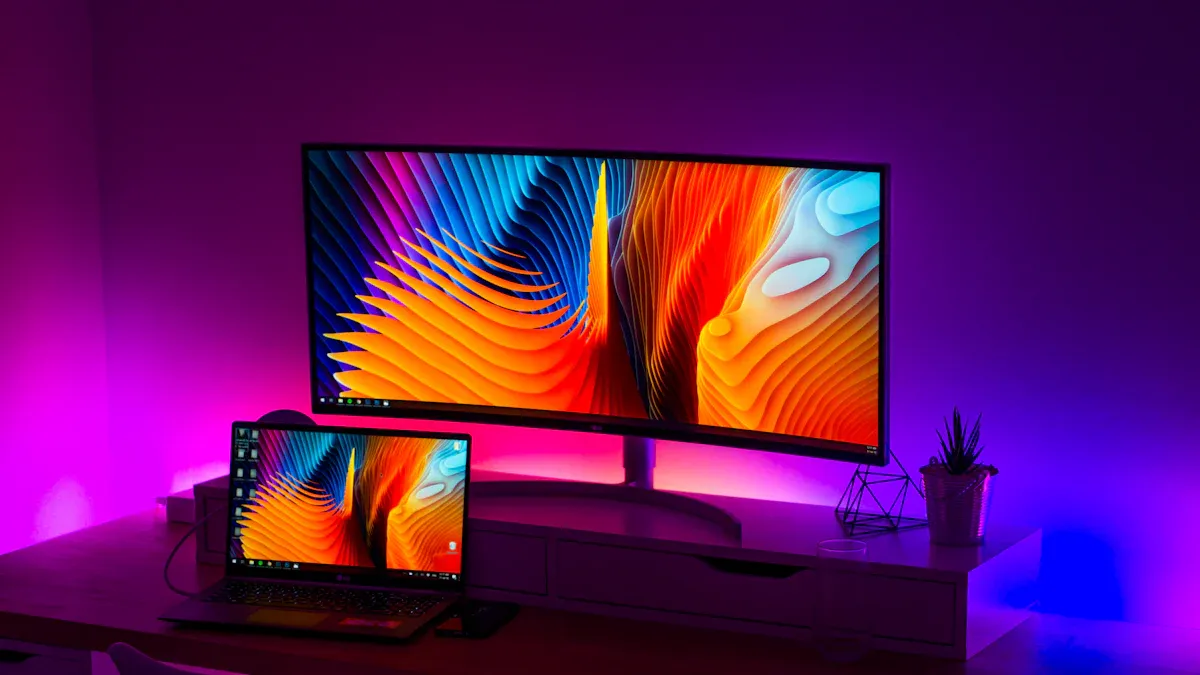
LED strip lights come in different types. Each type is made for special uses and features. Knowing these types helps you pick the right lights for your needs.
Standard LED Strip Lights
Standard LED strip lights are the simplest kind of LED lights. They usually show one color, which makes them good for general lighting. You can use them in many places, like under cabinets, in closets, or along hallways.
Feature | Description |
|---|---|
Light Quality | Gives steady light, often in warm or cool white. |
Applications | Often used for home and business lighting. |
Color Options | Comes in soft white, warm white, and cool white. |
These strips are easy to put up and can be cut to fit your area. They are great for making a cozy feel in living rooms or giving bright light in work areas.
RGB and RGBW LED Strip Lights
RGB LED strip lights let you enjoy many colors. They mix red, green, and blue LEDs to make different shades. This makes them great for fun lighting effects. You can use them for accent lighting, entertainment spots, or parties.
RGBW LED strip lights go further by adding a special white LED. This gives a brighter and clearer white light, making them more useful. You can switch between bright colors and warm white light, so they work well for both fun and calm settings.
Feature | RGB LED Strip Lights | RGBW LED Strip Lights |
|---|---|---|
White Light Quality | Mixed white from RGB colors | Brighter and clearer white from special LED |
Versatility | Limited to color effects | Better for both color and white light |
User Control | Basic RGB control | Similar control with extra white options |
You can find these strips in many uses, from TV backlighting to store displays. They add a fun and colorful look to any place.
Smart LED Strip Lights
Smart LED strip lights are the future of lighting. These lights connect to your home systems. You can control them with smartphone apps or voice commands. You can change brightness, color, and even set times for when the lights turn on or off.
Some key features of smart LED strip lights include:
Works with major smart home systems like Alexa and Google Home.
AI features let you use voice commands to change lights.
Bluetooth for offline use, keeping your data safe.
Feature | Description |
|---|---|
Voice Control Compatibility | Works with Alexa and Google Assistant for voice commands. |
App-Based Automation | Custom timers and automations through special apps. |
Connectivity | Connects via WiFi and Bluetooth, works with Android and iOS devices. |
Smart LED strip lights not only make things easier but also save energy. You can create the right mood for any event with just a few taps on your phone.
Installation of LED Strip Lights
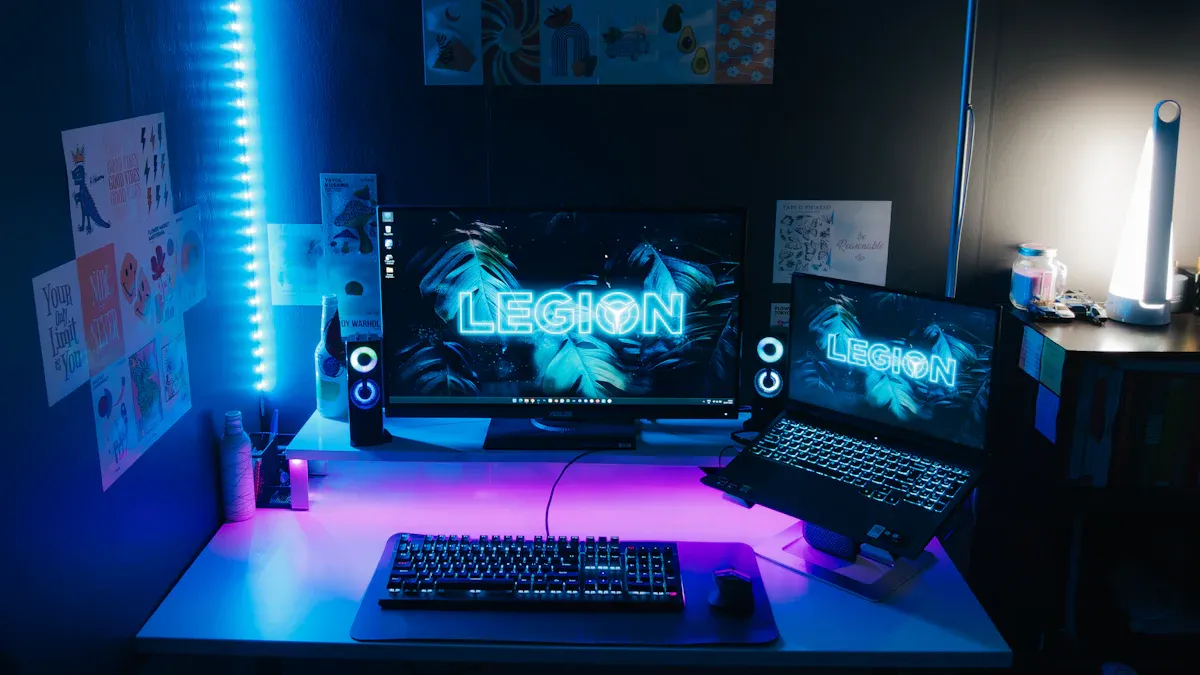
Putting up LED strip lights can make your space look great. To start, gather some important tools and materials.
Tools and Materials
Here’s a list of what you will need for your installation:
LED strip light set
Power supply
Connectors
Scissors
Measuring tape
Cleaning supplies
Having these items ready will help your installation go smoothly.
Installation Steps
Follow these steps to install your LED strip lights safely:
Choose where to install it, making sure it’s near a power outlet.
Measure the area and write down the size. Avoid sharp bends in the strip to keep it bright.
Cut the strip if needed. Make sure it is unplugged before cutting.
Clean the surface with a wet cloth to get rid of dirt. A clean surface helps the sticky part stick better.
Peel off the backing and press the strip onto the surface. Do this every six inches to keep it secure.
Connect the strip lights to a power source, following safety rules. Check the details of your LED strip and power supply to avoid problems.
Tip: If you are putting it on rough areas, think about using clips or extra adhesive for better support.
By following these steps, you can enjoy the benefits of LED strip lights in your home or workspace. Always check the manufacturer’s instructions for specific details about your LED strip lamp.
Key Considerations for LED Strip Light Selection
When picking LED strip lights, think about some important things. These things will help you find the best lights for what you need.
Brightness and Color Options
Brightness is very important for how well your LED strip lights work. You measure brightness in lumens. Different strips have different brightness levels. For example, you might want bright white light in a kitchen. Warmer tones are better for mood lighting in a living room.
You also have many colors to choose from. Here are some options:
Warm white makes a cozy place for relaxing.
Cool white gives bright light for work areas.
Color changing options like RGB strips make a party lively.
Feature | Description |
|---|---|
Brightness | Measured in lumens, brightness can change a lot based on the strip light you choose. |
Color Temperature | Comes in different color temperatures, from warm white to cool white to RGB options, allowing for fun color changes. |
Safety and Heat Generation
Safety is another important thing to think about. Look for LED strip lights that follow safety rules. Check for certifications that show they are good quality. Managing heat is key for how well they work and how long they last.
LEDs do create heat, but good heat dissipation parts, like aluminum heat sinks, help keep them working well. If there is not enough airflow, it can make your lights last less time.
Tip: Make sure your installation area has good airflow to stop overheating.
Power Requirements
Knowing power needs is important for your LED strip lights. Different types of strips use different amounts of power. For example, WS2811 strips use 1.27 watts when idle and 19.68 watts when fully bright.
LED Strip Type | Idle Power Consumption | Full Brightness Power Consumption |
|---|---|---|
WS2811 | 1.27 watts | 19.68 watts |
WS2812B | 0.5 watts | 13.6 watts |
WS2815 | 3.52 watts | 20.18 watts |
SK6812 | 0.83 watts | 10 watts |
To find total power use, use this formula: Wattage = wattage/meter * length of LED strips. For example, if your LED strip uses 8W/m and you have a 5-meter roll, the total power use would be 40W (8W/m * 5m).
By thinking about brightness, safety, and power needs, you can make smart choices when picking LED strip lights for your space.
In 2025, LED strip lamps will be very important for homes and businesses. They save energy and can be used in many ways. Here are some main benefits to think about:
Benefit | Description |
|---|---|
Thermal Management | Good installation and airflow are needed to stop overheating and help them last longer. |
Advanced Lighting Options | Features like RGB, RGBW, and Tunable White allow for more creativity and usefulness. |
Quality and Safety | Certifications like UL, CE, and RoHS show they are safe and made well. |
Proper Installation Practices | Using the right installation methods is key for getting the best performance and safety from LED strips. |
With LED strip lights, you can lower your electricity bills and help the environment. They can last up to 50,000 hours, which means you won’t need to replace them often and create less waste. As you look at your choices, think about how these new lighting options can change your spaces while saving you money. Welcome the future of lighting with LED strip lamps!
FAQ
What are the benefits of using LED strip lamps?
LED strip lamps are great because they save energy, last a long time, and can be used in many ways. You can use them for different purposes, like accent lighting or task lighting. They also come in many colors and brightness levels to fit what you need.
How do I choose the right LED strip light for my space?
Think about brightness, color choices, and power needs. Measure your area and decide what mood you want. Look for strips that manage heat well and have safety certifications to make sure they are good quality and last long.
Can I cut LED strip lights to fit my space?
Yes, you can cut LED strip lights at the marked cut lines. Just remember to unplug the strip before cutting. This way, you can make them the right length for your area.
Are smart LED strip lights worth the investment?
Definitely! Smart LED strip lights are easy to use and flexible. You can control them with smartphone apps or voice commands. They also let you change settings, making your lighting experience better while saving energy.
How do I maintain my LED strip lights?
Keep your LED strip lights clean and free of dust. Don’t let them get wet. Check the connections often and make sure there is good airflow to stop overheating. Doing these things will help them last longer and work better.
See Also
Utilizing Smart LED Strips for Home Lighting in 2025
Selecting Top LED Strip Lights: 5 Expert Tips from SUNLITE
Effective Installation of LED Strip Lights in 2025
